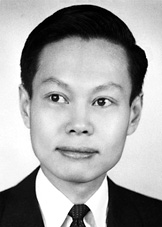Chen-Ning Yang
Created and Claimed by ryanbaker2754 (Ryan Baker). PHYS 2211.
Chen-Ning Yang, born on October 1, 1922 in Hofei, Anwhei, China, is a Chinese-born American who works toward the further development of particle physics as well as statistical mechanics. He is most known for his work on the Lee-Yang Theorem of quantum-mechanics for which he received a Nobel Prize (1957).

Early Years and Career
Lee-Yang Theorem
Notable Awards
Throughout his career as both a physicist and a professor Chen-Ning Yang has received many awards. Most notably, he received the Nobel Prize in Physics in 1957 for his work and development of the Lee-Yang Theorem in conjunction with physicist Tsung-Dao Lee. As a professor, in 1957, Yang earned the Albert Einstein Commemorative Award. Yang later went on to receive the Rumford Prize in 1980, the National Medal of Science in 1986, Oskar Klein Memorial Lecture and Medal in 1988, the Benjamin Franklin Medal for Distinguished Achievement in the Sciences of the American Philosophical Society in 1993, the Bower Award in 1994, the Albert Einstein Medal in 1995, the Lars Onsager Prize in 1999, and finally the King Faisal International Prize in 2001.
References
https://en.wikipedia.org/wiki/Chen-Ning_Yang
https://en.wikipedia.org/wiki/Yang-Baxter_equation
http://www.nobelprize.org/nobel_prizes/physics/laureates/1957/yang-bio.html
http://www.math.ucla.edu/~biskup/Summary/PFzeros.html
Further sources
Chuck Newman explains “Riemann Hypothesis and Statistical Mechanics” using Lee-Yang Theorem